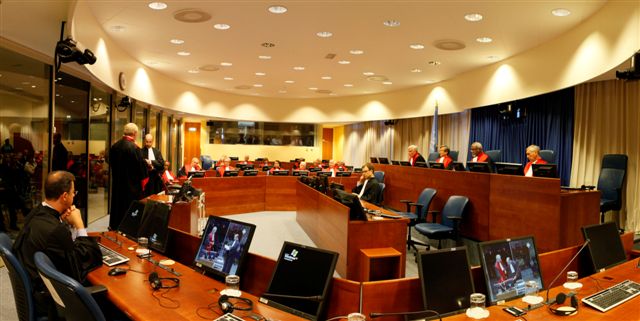The International Criminal Tribunal for Former Yugoslavia
Lana Šimon | 15 Feb 2018
The International Criminal Tribunal for Former Yugoslavia (ICTY), as the first war crime tribunal after the Nuremberg and Tokyo tribunals following the WWII, was created by the UNSC Resolution 827 in May 1993 to prosecute persons responsible for serious violations of international humanitarian law committed in the territory of former Yugoslavia beginning in 1999.
The Tribunal was created in the midst of war and the resolution proclaimed that it would “contribute to the restoration and maintenance of peace” and ensure that violations “are halted and effectively redressed”. As an ad hoc court, the Tribunal had a dual aim: to give justice to human beings who experienced and witnessed tremendous crimes within the conflict and to eradicate impunity for those who planned, instigated and executed the annihilation of thousands of lives. ICTY’s guideline was to stay fair and impartial in its judgements; not to take sides in the conflict and not to create an artificial balance between different ethnic groups. The evidence and witnesses’ testimonies were the basis upon which the prosecution presented the case and determined the guilt or innocence of the accused. The Tribunal individualised the guilt and protected entire communities from being labelled as “collectively responsible”. Senior political or military status could not exclude those individuals from the trial. For the first time in the history of law, rape was recognised as an instrument of terror and became an object of prosecution. By the end of the ICTY’s mandate, there were no more fugitives among those indicted, 154 proceedings out of total 161 cases were concluded and 4,650 witnesses were heard before the court.
However, the Tribunal had not functioned entirely as envisioned, its work had been undertaken well beyond the initial timeframe and it only finished the mandate by the end of December 2017, after when the national courts in the former Yugoslavia and the Mechanism for International Criminal Tribunals (MICT) took over and will complete the resting cases. Besides, its level of achievement had been critiqued by legal scholars and Balkan countries. They claimed that since the court was established by the international community and not on the request of the national level, it stayed distant and irrelevant, unable to bring justice and peace into the region. The level of support for the Tribunal varies among different region’s ethnic groups, but overall the majority of the population is staying sceptical for many reasons. Firstly, the court had only indicted and tried a small number of offenders, many suspects of war crimes continue to be at liberty. Furthermore, among the indicted leaders, the ability of Ratko Mladić and Radovan Karadžić to avoid arrest for more than a decade, fed suspicions of the court. Secondly, the ICTY had been criticised for being biased in its indictments. Serbs argued that the Tribunal was biased against them, as they had been the subject of two-thirds of all the indictments. Lastly, there had been lack of involvement of local actors in the work of the court and local political elites remained opposed to its operations. That can be partially attributed to the fact of an existing underdeveloped civil societies in the region and to the remaining opposing nationalist political parties in the parliaments. Today, due to its long years of work, one can sense a growing apathy towards the Tribunal. In 1999, the ICTY started an Outreach program to respond to those problems and to explain its operations and strategy to the public. The program did increase awareness in the region, but did not create a fully positive impression of the court.










Leave reply